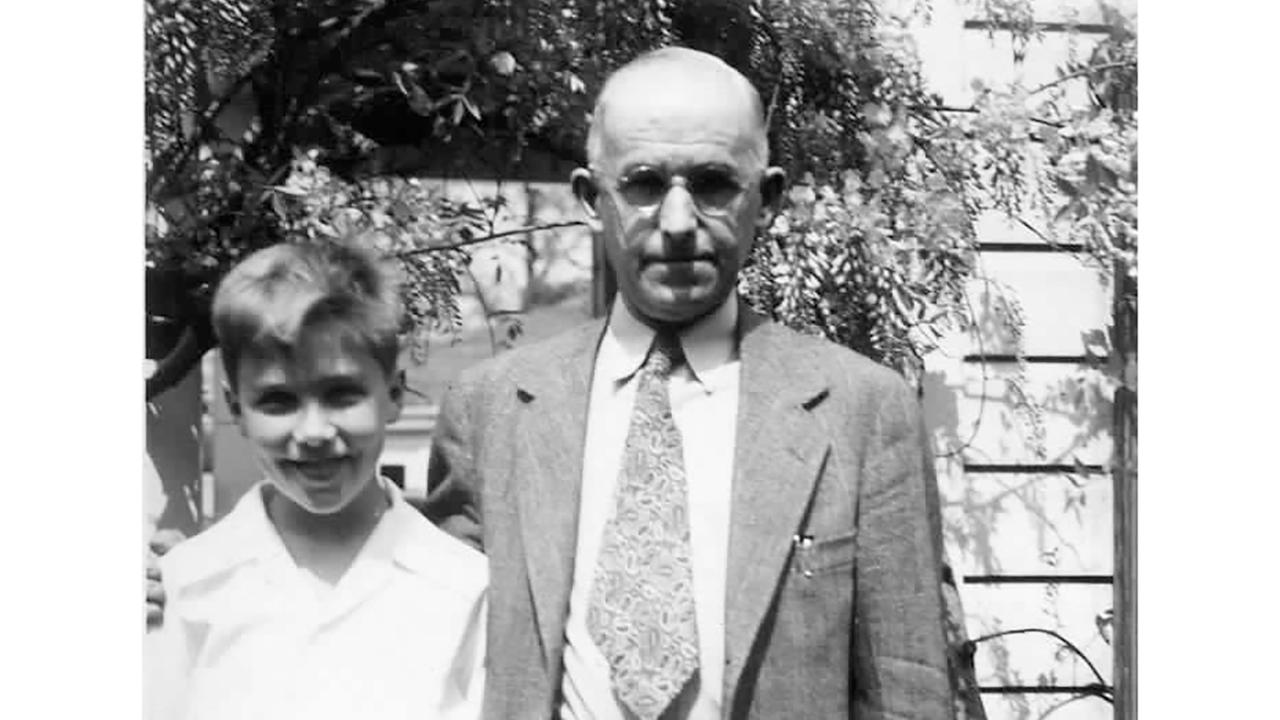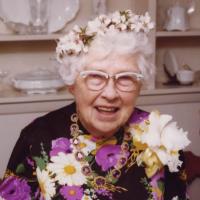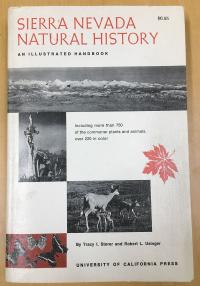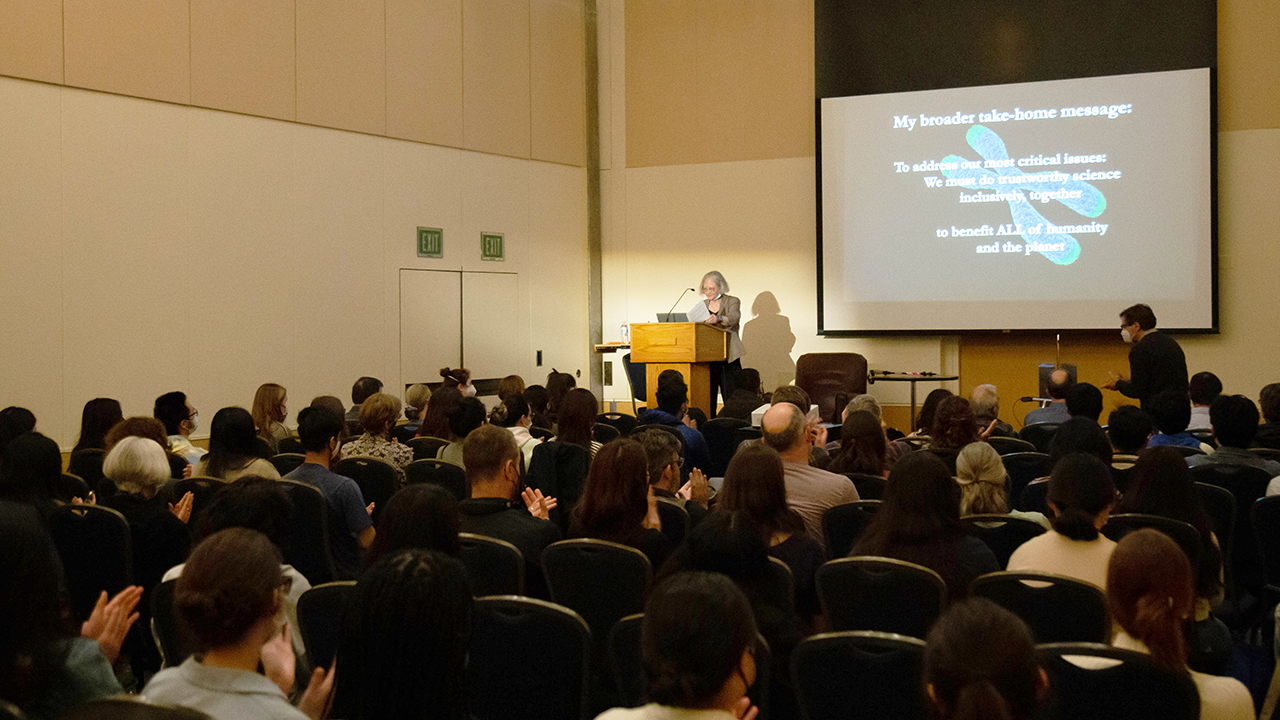
A Century of Sharing Scientific Knowledge: UC Davis Celebrates Professor Tracy Storer’s Centennial on Campus
Much has changed at UC Davis since Tracy Irwin Storer (1889-1973) arrived on campus in 1923 as the lone professor of what was then called zoology. Today, both the university and its role as a scientific center have expanded greatly, and the once-tiny zoology department has grown into nationally recognized teaching and research programs in evolution, ecology, and the wider biological sciences.
Yet a common thread links the small land-grant college Storer joined a century ago to the thriving university of today: his name. Storer’s love of learning and his passion for disseminating knowledge live on through the endowed Tracy and Ruth Storer Lectureship in the Life Sciences, which he and his wife Ruth Risdon Storer founded in 1960 and which brings renowned biologists—including Nobel Prize winners—to campus each year for seminars and discussions with faculty, students, and the public.
A Passion for Learning and Teaching
Storer was a dedicated scientist whose pioneering work on the fauna and flora of Yosemite broke new ground in the field of ecological study and whose textbook General Zoology became a core reference text in the discipline.

Ruth Storer, a powerhouse in her own right, was the only female graduate in the class of 1913 of what was then called the University of California Medical School, now UC San Francisco, and the first female doctor in Yolo County. She enjoyed a long career as a pediatrician, with a private practice she operated from an office in the Storer’s Davis home, and worked until the age of 80 at county health clinics and at the campus student health center, where she worked with incoming freshmen.
Tracy Storer was so influential on campus that when a new zoology building—which now houses the Department of Zoology’s successor, the Department of Evolution and Ecology—was built in 1969, it was named Storer Hall in his honor.
The Storers may have been towering figures at Davis, but their nephew, also named Tracy Sherman Storer, recall them warmly on a more personal level: “Tracy and Ruth are in my mind all the time,” he says. “They were like parents and mentors and good friends.” Born in 1934, the younger Storer grew up across the country from his aunt and uncle, yet the relationship was a close one, with the families traveling cross-country by train to connect.
“I was always learning from him,” says Storer. “One summer at our place on Staten Island, he asked, ‘What are you hearing?’ I said, ‘Lots of crickets,’ and he asked what I noticed. I said that their sounds were more frequent and louder than normal, and he told me about Dolbear’s Law, which lets you calculate the temperature if you know the rate of the crickets’ chirps. So he was always teaching.”

The younger Storer spent a summer living with his aunt and uncle in the mid-1940s. They took him on camping trips to the Sierra Nevada and Yosemite—the area of the elder Storer’s early research: “I have great memories of him strapping the tents on the car running boards,” he says. “We would explore, and he would write and take pictures. The magnitude of the Sierras and of the big trees was quite a contrast to what I saw on the East Coast.”
The elder Storer remained a companion and guide to his nephew on mountain trips even after he passed away: “I’ve done a lot of hiking with Boy Scouts and buddies in the mountains, and whenever I took those trips, I always took a copy of my uncle’s guide to the Sierra Nevada, having known the author quite well,” he says. “Everything is named—the trees, the birds—and it’s still in print and still a useful book.”
Disseminating Scientific Knowledge to All
Storer’s broad interests are honored in his namesake lecture series, which the Storer family continues to attend and which includes outreach to the general public and undergraduates as well as more specialized seminars for faculty and graduate students. “The Storer Lectureship continues to welcome esteemed speakers and researchers from any number of prestigious institutions,” says Mark Winey, dean of the College of Biological Sciences, which administers the series. “To see the series continue, with several events each year, is a great pleasure. There is such interest in the field of biological sciences, and the Storer series provides an ideal platform for the public exchange of ideas, which is a perfect legacy for Tracy Storer.”
A faculty committee, chaired by Joanna Chiu, a professor and chair in the Department of Entomology and Nematology, gives input on potential speakers from across scientific disciplines. “There’s so much biology at Davis, it’s important to bring in speakers in a range of topics,” says Chiu. “Tracy Storer was a zoologist, but we have the med school, veterinary school, neuroscience, ecology and evolution—all topics that were near and dear to the Storers.”

The committee also looks for diversity and important, cutting-edge research. “We are really looking to invite distinguished scientists who are best in their respective fields,” says Chiu. “We have had a few Storer Lecturers who came and got the Nobel later, which speaks to the committee being forward-looking.”
One such speaker is Charles M. Rice ’74, professor of virology at Rockefeller University, whose 2014 Storer lecture discussed his and colleagues’ work on Hepatitis C. Rice went on to receive the Nobel Prize in Physiology or Medicine in 2020. The 2014 lecture marked a return to Davis for Rice, whose undergraduate major was zoology: “The Storer lecture was a special visit given my wonderful undergraduate years at Davis in the early 1970s,” he says. “It was at UC Davis that my curiosity about science and biology was sparked, and the experiences that I had in the classroom and doing undergraduate research were in large part responsible for the career I’ve had.”
The lecture series has hosted many other notable speakers over the years, including UC Berkeley biochemist Jennifer Doudna, whose 2014 lecture discussing her work on CRISPR genome editing was so packed that students lined the walls and sat on the floor. The committee also selects notable speakers from outside academia; one memorable example was 2010 lecturer Rebecca Skloot, author of the bestselling book The Immortal Life of Henrietta Lacks. The book was a compelling look at medical ethics, race, and medical history, and Skloot’s lecture drew a large cross-disciplinary audience, including local community members.
The Future of the Storer Legacy
The 2023-24 lecture series promises equally timely and exciting scientific conversations, including visits from award-winning investigative journalist Amy Westervelt, host of the popular climate-change podcast Drilled, and from Kizzmekia Corbett, assistant professor of immunology and infectious diseases at Harvard, who will discuss her work on developing an mRNA vaccine against SARS-CoV-2.
Although Storer could scarcely have imagined such topics in 1923, they doubtless would have excited his scientific curiosity. “My uncle was what I would call a polymath,” says the younger Storer. “He had so many different areas of expertise, developed by an interested and curious nature. I learned a lot from that.” The Storers’ endowment, which was created in 1960 and supports the lectureship, ensures that UC Davis can carry on his century-long legacy—and that generations to come can continue to learn from it.
Media Resources
- Kate Washington, Ph.D., is a freelance writer based in Sacramento and the author of Already Toast: Caregiving and Burnout in America. Her work has appeared in the New York Times, TIME and Sunset, among other publications.
- Storer Lectureship in the Life Sciences